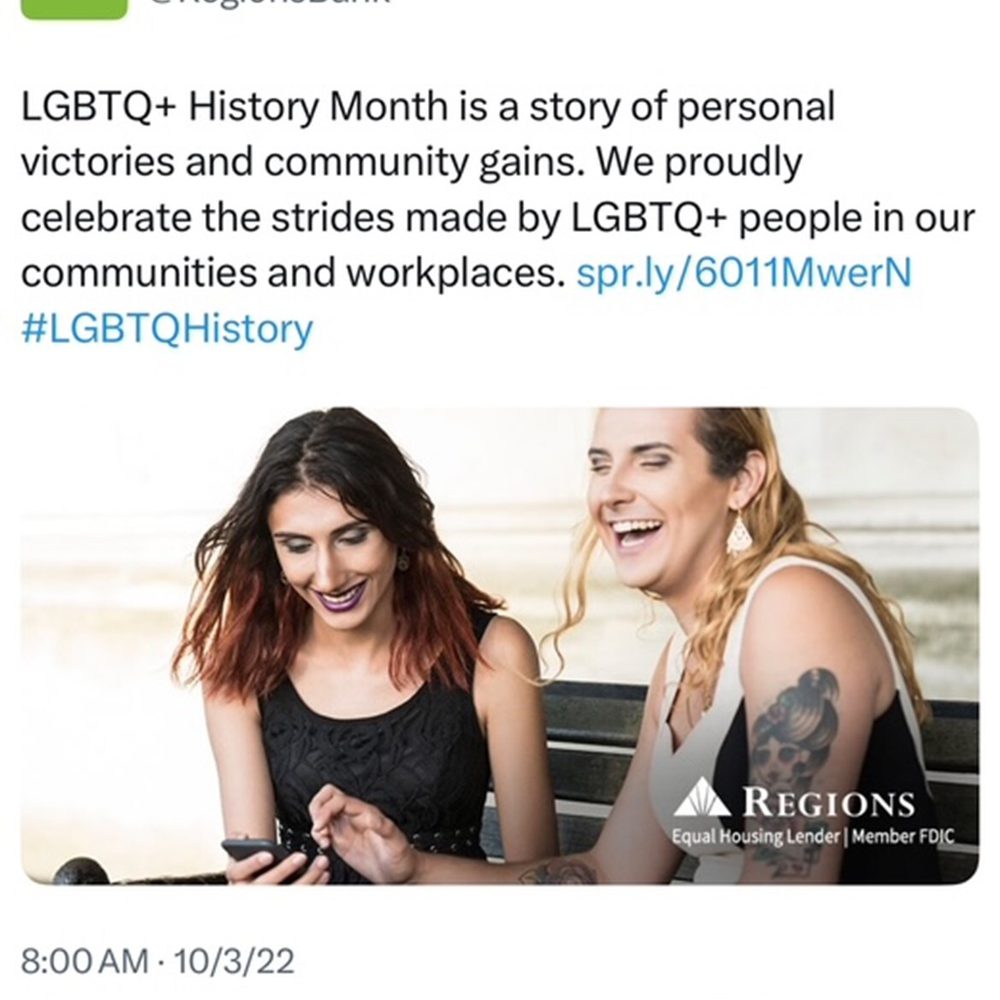When a major corporation responds to criticism by issuing what it calls a “fact sheet,” the public has a right to expect accuracy and good faith engagement with the actual arguments presented. Unfortunately, Regions Financial’s response to my recent article “Does Regions Financial stand for Alabama values, or undermine them?” demonstrates a troubling misrepresentation that raises questions not only about the company’s transparency but about its commitment to honest public discourse.
The most glaring problem with Regions’ purported “fact sheet” is not what it includes, but what it deliberately omits. The document lists numerous alleged “false claims” in the editorial, while systematically failing to acknowledge that these claims did not originate with me or 1819 News. Rather, they come directly from two organizations: The Claremont Institute and 1792 Exchange. Yet Regions’ response attributes these third-party assessments to 1819 News and “the writer,” creating the false impression that I personally made claims when I was simply relaying them.
This is not a minor editorial oversight; it’s a fundamental mischaracterization. When a news outlet reports on a Chamber of Commerce study, for instance, we do not attribute the study’s findings to the journalist. Regions’ failure to acknowledge this distinction suggests either a concerning lack of media literacy or a deliberate strategy to muddy the waters.
The legal implications of this misattribution are worth considering. By repeatedly suggesting that I personally made claims that were actually the assessments of established research organizations, Regions may be creating a false narrative about both my writing and professional conduct. This approach not only undermines the credibility of the original sources—The Claremont Institute and 1792 Exchange—but potentially exposes Regions to questions about whether its public relations strategy prioritizes accuracy or deflection.
>>> Does Regions Financial Stand for Alabama Values, or Undermine Them?
Perhaps the most egregious misrepresentation is the allegation that my piece claims Regions “engages with an advocacy group called Human Rights Campaign.”
I made no such claim. I quoted 1792 Exchange’s observation that the Human Rights Campaign (HRC) scored Regions on its Corporate Equality Index (CEI), with a direct link to HRC’s own publicly available scoring. Here’s that link again. You can read for yourself.
The distinction here is not semantic but substantive: there is a fundamental difference between a company actively partnering with an organization and that organization independently evaluating the company’s policies. One implies deliberate collaboration; the other represents external assessment.
By conflating independent evaluation with active engagement, Regions’ “fact sheet” constructs a straw man that bears little resemblance to what was actually written. When a major financial institution’s public response to criticism contains such an easily disprovable assertion, it inevitably raises questions about the integrity of its other claims and its commitment to honest public discourse.
What of those other claims?
Regions labels as false a claim that, again, originated not with me but with 1792 Exchange: that Regions “often yields to political activism in shaping corporate governance, potentially alienating consumers, dividing employees, and harming shareholders.” Regions’ response? “Our strategic plan focuses on three goals: soundness, profitability, and growth. The purpose is to benefit our customers, communities, associates, and shareholders. No ideological agendas.”
These lines fundamentally miss the point. To observe that an institution often yields to political activism in corporate governance does not preclude having a strategic plan focused on traditional banking metrics. Companies frequently drift from their strategic plans. The question is whether Regions’ actions align with its stated commitments. Having a sound strategic plan and occasionally departing from it for political considerations are not mutually exclusive propositions.
The real test lies not in corporate mission statements but in observable behavior. Do Regions’ public communications and corporate actions consistently reflect a singular focus on soundness, profitability and growth? Rather than offer my own interpretation, I invite readers to examine the evidence and draw their own conclusions about whether the bank’s public positioning aligns with its claimed commitment to avoiding “ideological agendas.”
Here, a senior VP at Regions states, “Fostering DEI is at the heart of Regions’ mission to make life better for the people it serves.” Here is another executive touting DEI at Regions.
And what of the following tweets?

(This image doesn't appear to be on Regions' X feed any longer.)

(This image doesn't appear to be on Regions' X feed any longer.)





(This image doesn't appear to be on Regions' X feed any longer.)
Now, watch this publicly available video featuring Regions’ Head of DEI, whose statements appear to contradict the bank’s fact sheet assertions about priorities. In this presentation, she explicitly outlines “three strategic priorities that really center our diversity, equity, and inclusion work,” with the first being, in her words, “really around talent, so that’s really our diverse talent strategy, and that’s the effort that we’re making to ensure that we have balanced representation across the organization from a demographic standpoint especially in critical leadership roles.”
The executive goes on to emphasize that “we really want all of our leaders to step up to the plate and be accountable to our diversity, equity, and inclusion work.” This language of organizational accountability to DEI initiatives suggests a level of institutional commitment that extends well beyond incidental policy considerations. When a bank’s senior leadership publicly articulates strategic priorities centered on demographic representation and requires leadership accountability to diversity work, it becomes difficult to reconcile such statements with claims that the institution operates with “no ideological agendas.”
These statements also directly contradict Regions’ fact sheet assertion:
Regions recruits employees based on merit—not based on identity characteristics. Likewise, Regions recruits vendors and suppliers based on merit—not based on identity characteristics. Further, there are no vendor, associate, or supplier ‘quotas’ or goals at Regions. We do not engage in preferential treatment and outcomes.
Yet a Senior Vice President at Regions has publicly stated, “Since launching its diversity, equity and inclusion program several years ago, executives with Regions Bank have been tireless in their pursuit of continuous improvement to a program that already is deep and far reaching into the company and the communities it serves.”
She continues:
The initiative started at the top. In 2018, the bank advanced its long-term commitment by recruiting seasoned DEI professional Clara Green to shepherd the program's expansion as executive vice president and head of Regions' Diversity, Equity and Inclusion Center of Expertise. Under Green's leadership, Regions created programs and conversations to address issues important to Black, women, LGBTQ+, Hispanic, BIPOC, bicultural and disabled employees and community members.
A deep and far-reaching DEI program that creates demographic-specific initiatives and requires leadership accountability appears fundamentally incompatible with claims of merit-only hiring and an absence of preferential treatment. Either Regions’ public statements about their DEI commitments are accurate, or their fact sheet denials are. Both cannot be true at the same time.
>>> Does Regions Financial Stand for Alabama Values, or Undermine Them? Part II
The evidence against Regions’ fact sheet claims is not difficult to find. Basic internet searches reveal contradictory material that undermines its assertions at multiple points. One suspects that with additional scrutiny, the documentation of such inconsistencies would only multiply, raising fundamental questions about the institution’s commitment to transparent public discourse.
Despite these concerns, there is reason for optimism. Regions has an opportunity to rebuild public trust and demonstrate a genuine commitment to Alabama values. The path forward is clear and achievable. Three simple commitments would resonate powerfully with Alabama customers and communities.
First, Regions should publicly commit to ending all DEI practices and instead focus on merit-based hiring and advancement that serves all customers equally. Second, the bank should commit to abandoning ESG investment strategies and prioritizing financial returns that benefit both shareholders and customers. Third, Regions should guarantee that it will never engage in debanking customers based on their political or ideological views, ensuring that financial services remain accessible to all law-abiding Alabamians regardless of their beliefs.
These commitments would signal a fundamental return to the principles that built Alabama’s economy and communities. Regions has the chance to become the bank that Alabamians genuinely want and deserve: one that serves customers without political litmus tests, invests based on sound financial principles rather than social agendas, and treats all people with equal dignity and respect.
Alabama deserves a banking partner that reflects its values of hard work, personal responsibility, and equal opportunity. Regions can be that partner. The question is whether corporate leadership will choose the path of genuine service to Alabama communities or continue down the road of deflection and misrepresentation.
The choice is theirs. Alabama is watching.
This piece originally appeared in 1819 News




